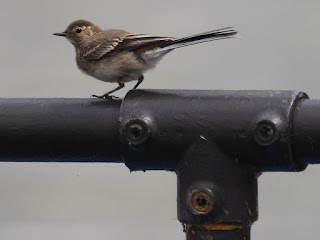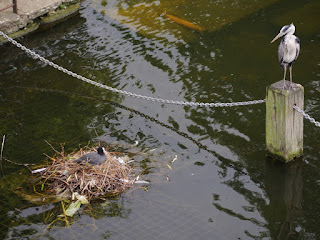Another view from the bridge, of the Great Crested Grebe family on the Long Water. They were being fed fish after fish and, thanks to their careful parents, have a good chance of survival.
The other grebe family, from the nest on the island, were travelling around the lake. It's easier to take the chicks to where the fish are than to bring the fish a long distance to the chicks.
The Black Swan is still at the east end of the Serpentine, but was just cruising round by himself when I went past.
A pair of Greylag Geese led their goslings to feed on some tasty weeds on the nearby shore.
The combined broods of Canada Geese were taking it easy under a willow tree.
The following two distant, hastily snatched photographs are bad, but they are quite interesting. The pigeon-killing Lesser Black-Backed Gull was chasing a pigeon in the air, and managed to grab it.
But the pigeon struggled free, leaving the gull with nothing but a few feathers in his beak.
The young Grey Heron which hangs around the Dell restaurant was peering intently into one of the reed rafts.
Perhaps there was a Moorhen chick among the plants.
A young Pied Wagtail, now old enough to be catching its own insects, paused for a moment on the handrail of the Lido jetty.
A pair of Carrion Crows at the Vista were looking after their three young. One adult, pestered by two at once, lost patience and shooed one away.
Amid a crowd of Wood Pigeons near the Albert Memorial there was just one young one, distinguishable from the adults by not have a white collar.
The female Little Owl at the leaf yard was enjoying a sunny spell.
A woolly caterpillar made the perilous crossing of the path near the Diana fountain, narrowly avoiding being squashed by the feet of passing humans.























































